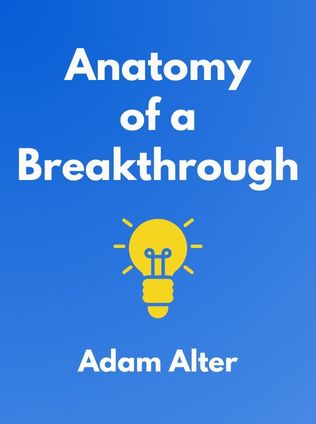
Anatomy of a Breakthrough
How to Get Unstuck When It Matters Most
By Adam Alter
Published 05/2023
About the Author
Adam Alter is a renowned psychologist and professor at New York University, known for his extensive research in behavioral addiction and the influence of environment on human behavior. He has authored several influential books, including "Irresistible" (2017), which delves into the addictive nature of technology, and "Drunk Tank Pink" (2013), which explores how our surroundings subtly shape our thoughts, feelings, and behaviors. In his latest book, "Anatomy of a Breakthrough" (2023), Alter addresses a universal human experience: the feeling of being stuck in life, and offers a comprehensive guide to overcoming these obstacles.
Main Idea
In "Anatomy of a Breakthrough," Adam Alter explores the concept of feeling "stuck"—whether in a career, a creative endeavor, or a personal life situation. He argues that this sensation is not a sign of weakness or failure but a fundamental part of the human experience. Alter provides a range of strategies to help individuals navigate these challenging periods, emphasizing the importance of persistence, flexibility, and self-compassion. The book combines insights from psychology, personal anecdotes, and practical advice to guide readers toward achieving their goals and breaking through barriers.
Table of Contents
- Introduction: The Universal Struggle
- When You Feel Stuck
- Good Stories, Bad Perspectives
- The Long, Winding Road
- Pitfalls in Your Path
- The “F” Word: Failure
- Getting Unstuck
- Stay Calm and Slow Down
- Reject Perfectionism
- Keep Inching Forward
- Explore New Directions
- Persist and Get Lucky
- Conclusion: The Anatomy of a Breakthrough
Introduction: The Universal Struggle
Adam Alter opens his book by acknowledging a truth that resonates with many: at some point in our lives, we all feel stuck. Whether it’s a writer’s block, a career stagnation, or a personal life rut, this feeling can drain our motivation and halt our progress. Alter argues that these moments of stagnation are not failures but essential parts of the human journey. He encourages readers to view these periods as opportunities for growth and transformation.
Alter states,
"Feeling stuck is not a sign of weakness or failure. It's a fundamental part of the human experience."
He underscores that recognizing this shared experience can be the first step towards overcoming it. By understanding that everyone goes through such phases, individuals can find solace and motivation to move forward.
When You Feel Stuck
Alter dives into the common characteristics of feeling stuck, describing it as hitting a wall in some aspect of life. This could be a career, an important relationship, or a long-term project. He explains that these blocks are not everyday challenges but significant obstacles that stall progress on something deeply important. The key is to recognize that feeling trapped is a shared experience, not an isolated one.
Characteristics of Being Stuck
- Progress stalls long enough to wear you down.
- Existing solutions are ineffective.
- The situation feels like an existential threat.
- Your brain may shut down, further impeding progress.
Alter elaborates on the psychological impact of feeling stuck, noting that it can create a sense of helplessness and frustration. He emphasizes the importance of acknowledging these feelings rather than suppressing them.
- Applying for jobs without success.
- Trying to lose weight but seeing no results.
- Struggling to complete a creative project.
In describing these scenarios, Alter highlights the emotional toll that prolonged stagnation can take. He encourages readers to view these experiences as part of a broader human condition rather than personal failures.
Good Stories, Bad Perspectives
Alter addresses the impact of survivorship bias and story bias on our perception of success and failure. Survivorship bias leads us to overemphasize success stories while ignoring the common struggles and failures behind them. Story bias causes us to prefer narratives over facts, making us more likely to believe in unrealistic success stories.
Sign up for FREE and get access to 1,400+ books summaries.
You May Also Like
The Subtle Art of Not Giving a F*ck
A Counterintuitive Approach to Living a Good Life
By Mark MansonRich Dad Poor Dad
What the Rich Teach Their Kids About Money - That the Poor and Middle Class Do Not!
By Robert T. KiyosakiHow To Win Friends and Influence People
The All-Time Classic Manual Of People Skills
By Dale CarnegieFreakonomics
A Rogue Economist Explores the Hidden Side of Everything
By Steven D. Levitt and Stephen J. Dubner



















